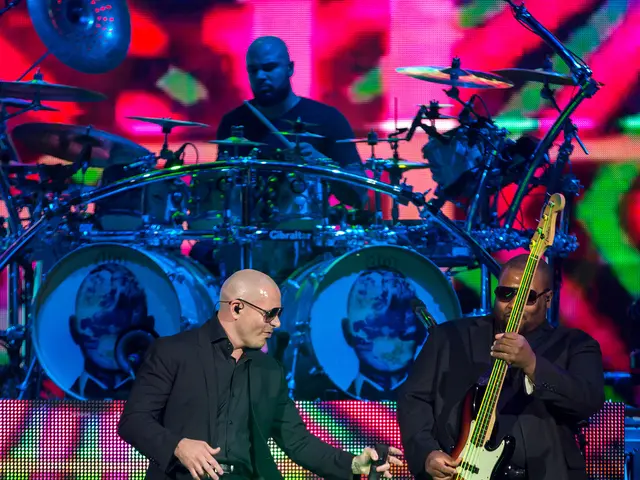Meet in Washington: Trump Greets Netanyahu at the White House
- Trump meets with Netanyahu at the White House
In the heart of Washington, Israeli Prime Minister Benjamin Netanyahu had an audience with U.S. President Donald Trump at the White House. Trump gave him a hearty handshake in front of the government headquarters, setting the stage for their conversation. Netanyahu had mentioned prior to the meeting that he wanted to speak to Trump about various topics, such as the new U.S. tariffs, attempts to free hostages held by Hamas in the Gaza Strip, and the looming Iran threat.
Trump and Netanyahu refrained from holding a joint press conference following their Washington meeting, in contrast to the initial plans. A White House official announced this without providing a reason. However, journalists were still present at the start of the meeting in the president's office, like usual, where sometimes questions are addressed.
Trump welcomed Netanyahu for the first time at the beginning of February during his new term. Now, he was the first foreign head of government to visit the White House for talks since the announcement of the new tariffs.
Trump made a splash last week by unveiling a massive tariff package, which affects Israel as well. In addition to the existing 10 percent universal tariffs for all countries, Israel faces an additional 17 percent starting on Wednesday. This second round of tariffs targets countries that, in the U.S. administration's estimation, have an unprecedented trade deficit with the United States. According to reports from the "Wall Street Journal," Israel exports goods worth $22 billion to the U.S. each year.
- Washington
- Donald Trump
- Benjamin Netanyahu
- Israel
- US President
- Hamas
- Gaza Strip
- Iran
Insights:
During the meeting, U.S. President Donald Trump and Israeli Prime Minister Benjamin Netanyahu tackled several substantial issues.
US Tariffs:
- Netanyahu's visit aimed to address the recently imposed U.S. tariffs on Israeli goods, which are set at a 17% rate. The tariff issue is a significant concern for Israel, as the U.S. is its largest trading partner.
- Trump temporarily froze tariffs above the base rate of 10% for three months, but did not commit to reducing the 17% tariff on Israeli goods. The visit initiated a dialogue between the two governments to negotiate tariff reductions in the future[1][2][3].
- The tariffs could potentially lead to significant economic losses for Israel, with potential job losses ranging from 18,000 to 26,000 and an estimated $2.3 billion hit to exports[2].
Hamas Hostages:
- The ongoing conflict in Gaza and the release of hostages held by Hamas were key agenda items. Netanyahu sought U.S. support in resolving the hostage crisis, involving 59 Israeli hostages.
- Several proposals, including those from Egypt and Hamas, are being considered to facilitate a hostage release. Israel prefers a phased approach that prioritizes hostage releases without immediately ending the conflict[2][3].
- Trump, while giving Israel the freedom to handle the situation for the moment, might eventually pressure Netanyahu to agree to a full hostage deal and end the war to focus on other priorities[3].
Iran Nuclear Issue:
- Israel is concerned about U.S.-Iran nuclear negotiations, fearing that diplomacy might not effectively curb Iran's nuclear ambitions. Netanyahu advocates for a "Libyan model," which demands the complete dismantling of Iran's nuclear infrastructure—a demand Iran is unlikely to accept[3].
- Israel sees a limited window for military action against Iran if diplomacy fails. The U.S. and Israel are trying to align their strategies on how to handle the Iranian nuclear threat[1][3].
- The U.S. has initiated expedited nuclear talks with Iran, maintaining communication with Israel to ensure coordination. Israel is wary of potential concessions the U.S. might make to secure a deal[3].
The Commission, responsible for managing the financial aspects of the European Union, has also been involved in the preparation of the draft budget for the European Union.
During their meeting in Washington, the Israeli Prime Minister, Benjamin Netanyahu, and the U.S. President, Donald Trump, discussed potential trade implications for Israel due to the new U.S. tariffs, which are affecting the country's exports to the U.S. worth approximately $22 billion annually.
In the Oval Office, following his handshake with President Trump, Prime Minister Netanyahu expressed his concerns about the proposed tariffs and the potential impact on Israel's economy.








